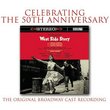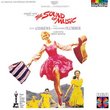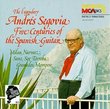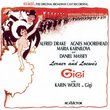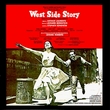| All Artists: Original 1949 Broadway Cast Recording Title: South Pacific Members Wishing: 1 Total Copies: 0 Label: Sony Classics Original Release Date: 1/1/1949 Re-Release Date: 5/5/2009 Album Type: Cast Recording Genres: Pop, Broadway & Vocalists Style: Musicals Number of Discs: 1 SwapaCD Credits: 1 UPC: 886974991922 |
Search - Original 1949 Broadway Cast Recording :: South Pacific
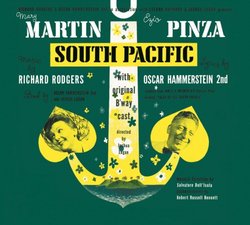 | Original 1949 Broadway Cast Recording South Pacific Genres: Pop, Broadway & Vocalists
|
Larger Image |
CD DetailsSimilar CDsSimilarly Requested CDs
|
CD ReviewsMagnificent Performance, but, Alas, Poorly Remastered Great Faulkner's Ghost | Washington, DC | 09/17/2009 (5 out of 5 stars) "When I saw that Sony Classics had reissued this CD in May of 2009, I was hoping that it was a new transfer/remastering to compact disc of this enduring and (potentially) magnificent sound recording from 1949. Unfortunately, that does not appear to be the case. This appears to be the 1998 transfer/remaster, but now packaged in an eco-friendly cardboard digi-pack instead of the old plastic case. Other than that, it's the same. So, what's the problem with the 1998 remaster? The problem is that the first CD release of this, from 1988, sounds SO MUCH BETTER! The 88 release is one of the most natural, rich, and "analog" sounding compact discs in my collection, quite amazing for the early compact disc era, when compact discs were themselves not yet a mature technology. The 88 appears to be a relatively straight transfer of the master tape. In contrast, the 98 version has a decidedly brittle sound, which several people have remarked upon in their review of the 1998 release, apparently unaware of how good the 88 sounds The root of the problem appears to be that the 98 mastering seems to have used rather cold sounding electronics for the transfer from tape to digital, and perhaps some digital processing, which has made the sound tinny and "synthesized." What we really need now is a flat transfer of the 1949 tapes,using proper analog mastering equipment. Until then, the release you want is the first release on compact disc (1988; Columbia CK 32604; DIDP 70263; Barcode: 7464-32604-2). The 1988 CD has the same cover as the mid-1950s LP release, the close-up of the Ezio Pinza and Mary Martin instead of the anchor pattern.) The 1988 compact disc does not have the extra cuts of the 1998 transfer, but the sound is so much better, but it's well worth looking out for. I hope that some day Sony will consider releasing this again with a sensitive and respectful remaster. The performance, quite apart from the medium, is magnificent and deserves the best possible archival restoration." Try and find the 1988 CD Release Publius | NY NY | 01/23/2010 (3 out of 5 stars) "I have just listened to a copy of the first CD release of this score. I am told this first CD release was transferred from the 78 masters (must have been acetates because there is next to no surface noise). The mastering (uncredited as far as I can tell) is superb. On this older CD the recording sounds better than many tapes from the early to mid 1950's, and can be truly considered one of the first mass-market, high-fidelity recordings. This was also the first original-cast LP to be issued in both the then-standard "album" of 10-inch 78 rpm discs, and also in Columbia's new LP format. The Sony/Columbia transfer of the 1947 Finian's Rainbow is good (although there is surface noise that probably could have been eliminated), but not this good. South Pacific was, I believe, also the first to be recorded using both the standard method of direct-to-disc cutting and on magnetic tape (a medium that became known only after WW II).
I am told that up to the current remastering, all previous releases of this recording had used the 78 transfers, not the tape. Now I know why. The sound is not only better, it is SIGNIFICANTLY better on the earlier CD release. On the new release the frequency range is quite limited; on the earlier release you get the full range up to 20K hz. Further, the grainy, harsh sound on this newer release, and some tape drop outs, are either due to a significant deterioration of the tape over 50-60 years, or the fact that tape technology was still rapidly evolving, and this was Columbia's first serious foray into the medium, or both. Apparently the technology for the 78's was significantly improving as well, but that medium was doomed, due to the limitation of the length of a side, and the fact that one could edit tapes. Comparing the two CDs: The First Release: Wonderful Sound. Downsides: Slight amount of reverb added, no bonus tracks, and on one track, You've Got to Be Carefully Taught a phrase right at the end of the song is cut, which is jarring to those who are used to it being there, and the song as written and performed has it. Why it is missing is a mystery. The "Remastered Release: Mediocre sound, that's harsh on the ears. Bonus tracks: The ones by Martin and Pinza are nice to have (especially Loneliness of Evening, and My Girl Back Home which had been cut during the tryouts). The Suite complied by Robert Russell Bennett, however, is just a medley and musically pretty forgettable. My Girl Back Home was put back in the movie and the current Broadway revival. Loneliness of Evening has found its way into staged versions of R&H's Cinderella, where it fits. If you love the score and also think that the original is still one of the, if not the, best recordings, see if you can find a used cc of the earlier CD release somewhere. It is out of print now. You can reference it here: [...]" |

 Track Listings (20) - Disc #1
Track Listings (20) - Disc #1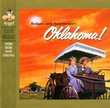
![Camelot [Original Broadway Cast Recording]](https://nationalbookswap.com/cd//m/03/4703/84703.jpg)
![The Music Man (1957 Original Broadway Cast) [Angel Reissue]](https://nationalbookswap.com/cd//m/02/4802/84802.jpg)
